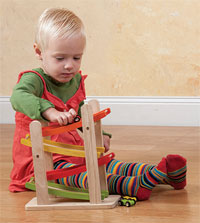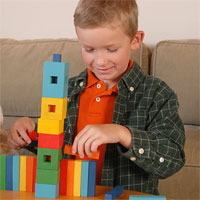
Last spring I bought my four-year-old grandson a set of gardening tools and he helped his dad plant a garden. The next day he spent at least an hour digging one hole. He said he was "looking for things in the ground." The next day he went out to dig again. After a little while, he came in for his dump truck and bulldozer, saying "the construction site is ready."
 In this era of goal-oriented and scheduled activities, have we lost sight of our children's need for free play? What happened to the carefree days of "just playing" until it was time for dinner or bed? As parents, do we know how to let go of providing our children with endless activities and opportunities?
In this era of goal-oriented and scheduled activities, have we lost sight of our children's need for free play? What happened to the carefree days of "just playing" until it was time for dinner or bed? As parents, do we know how to let go of providing our children with endless activities and opportunities?
Joy and self-esteem are not measurable on an IQ or SAT test. Intelligence and creativity develop as children explore the world, figuring out on their own how things work.
One of your most important jobs as a parent is to prepare a safe environment inside and outside, so that your child can explore and play for periods of time on his own, without your help or direction. To make this space in your home, you could:
 Arrange a few toys on a low shelf so your child can see and reach them. A jumble of toys in a toy box can be frustrating. Alternate toys from time to time rather than having everything out at once.
Arrange a few toys on a low shelf so your child can see and reach them. A jumble of toys in a toy box can be frustrating. Alternate toys from time to time rather than having everything out at once.Common household objects can inspire great imaginary play. Boxes of many sizes, scarves or sheets, safe kitchen or work tools will provide children with hours of inventive play.
 Unstructured play is a time of discovery and learning without self-consciousness. While playing with and exploring toys, blocks, tools, and nature, your child is learning so much without being directly taught: weight and balance, strength and coordination, texture and colors, etc.
Unstructured play is a time of discovery and learning without self-consciousness. While playing with and exploring toys, blocks, tools, and nature, your child is learning so much without being directly taught: weight and balance, strength and coordination, texture and colors, etc.
Play allows children to learn self-regulation. Listen for the "rules" children create during their play - they are so often ideas they have heard from home or school that are being internalized.
The only time you need to intrude is when children are in danger, or the toys are being damaged. Don't interrupt or try to improve the project. A child will unconsciously feel judged and may stop trying for fear of doing it wrong. A young child's castle built of blocks will never be as elaborate or as straight as yours.
 The young toddler may be feeding his doll or telling the truck driver how to load the blocks. A three-year-old may play alongside a friend, happy with the company, but not interacting a lot. Cooperative play will happen as children mature, so there is no need to force it. Let your children take the lead.
The young toddler may be feeding his doll or telling the truck driver how to load the blocks. A three-year-old may play alongside a friend, happy with the company, but not interacting a lot. Cooperative play will happen as children mature, so there is no need to force it. Let your children take the lead.
When you play with your children, make it fun! Let your child choose the activity and make the rules. Games that require following the rules are appropriate for children over five or six years of age. Play in a non-competitive way where everyone feels like a winner.
Allowing time for free play is not just one more thing to do in order to be a "good parent." Free time gives everyone time to refuel, think, and figure things out. The truth is that your child will grow, learn, and thrive without the constant organized frenzy. Choose to have a day or two with planned free time, eliminating just one violin lesson or tutoring session each week. What if you didn't spend every day chauffeuring and cheering your children on at the latest event or game? There would be much less stress for your whole family, more time to relax and play.
Pursue your own play: do artwork, knit, or make something in your workshop. If your child is interested, let him watch, but continue on your own path, not succumbing to the temptation to be interrupted. You are modeling for your child, as you make your own discoveries and enjoy doing that which interests you.
You need not write the script for your child's life. Your child has within herself remarkable individual talents that will surprise you as she learns to play and become a master of playful learning.
"In real play, which is real concentration, the child is not only outside time, he is outside himself. He has thrown himself completely into whatever it is that he is doing. A child playing a game, building a sand castle, painting a picture, is completely in what he is doing."
—Madeleine L'Engle, A Circle of Quiet
—by Jane M. Jacobs, M.A., Montessori Educational Consultant at Montessori Services. She is a trained primary Montessori directress and also a Licensed Marriage and Family Therapist. She has taught children aged 2 to 7 years in Montessori schools, Headstart, and also in a preschool for children with developmental challenges. In her counseling practice, she helps individuals, couples, and families.
—Originally Published 2014